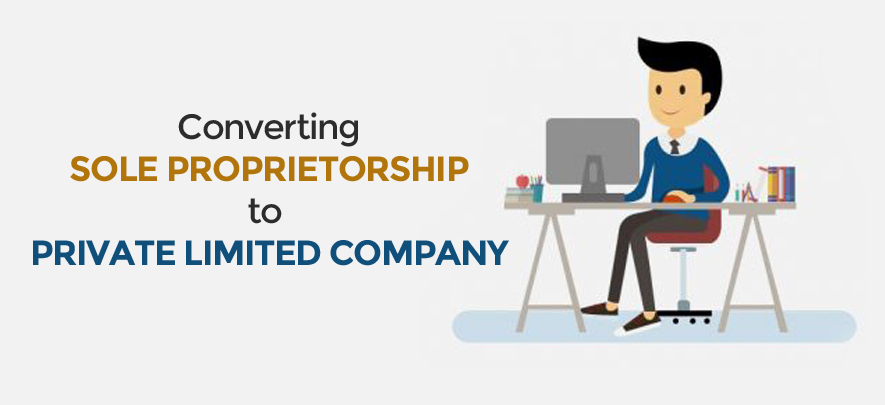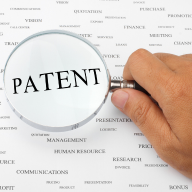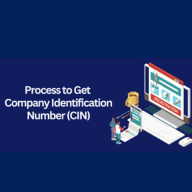How to convert a sole proprietorship into Private Limited Company?

Legal & Compliance
301 week ago — 7 min read
Background: A Private Limited Company offers a host of benefits over proprietorship business. Advantages likelimited liability, ability to attract equity capital, continued existence and much more have attracted many entrepreneurs to convert their business to Private Limited Company. To convert a Sole Proprietorship into a Private Limited Company, an agreement has to be signed between the Proprietorship and the Private Limited Company (once it is incorporated). Further, a Private Limited Company so incorporated must have “the takeover of a Sole Proprietorship Concern” as one of the objectives in its Memorandum of Association. Vakilsearch in their previous article explained the tax benefits for startups in India under the Startup India scheme. In this article you will learn how you can convert a sole proprietorship into a Private Limited Company.
As a business develops, the demands of a growing entity and the downsides of an ownership firm could constrain a business person to begin the procedure for converting ownership into Private Limited Company. A Private Limited Company offers considerable benefits over the ownership type of business, including that of constrained obligation, capacity to draw in fair capital, constant presence and so on. In this article, we take a look at the prerequisite and methodology for change of ownership into a private limited company.
A Private Limited Company offers considerable benefits over the ownership type of business, including that of constrained obligation, capacity to draw in fair capital, constant presence and so on.
Pros and cons of either entity
These issues are significant contemplations at the front line of worries for entrepreneurs who need to change over from sole ownership to a Private Limited Company:
- Separate legal entity
With regards to sole proprietorships, the proprietor and the business are one and the equivalent under the law and in your dealings with general society. Despite the fact that you have the benefit of more self-governance over the business and its activities, you are monetarily and legitimately in charge of all risk against the business, for example for obligations and in claims.
- Liability
As a registered Private Limited Company under The Companies Act 1956, a business has a different legal identity from the proprietor; the organisation members have restricted liability. For sole ownership, loan providers may take legal action against you for debts brought about and venture into your own assets and property. Consequently, a sole owner faces a more serious danger of complete individual budgetary ruin contrasted with a CEO of a Private Limited organisation.
- Tax benefits
Private Limited Companies make good on corporate tax on their benefits and profits that the investors get where profits are not taxed. Duties are resolved at your own income tax rate.
- Limited capital
Sole ownership regularly has restricted subsidising raising choices, regardless of whether as far as getting advances from monetary establishments or as far as equity fundraising from financial specialists – which means your sources of working capital are constrained to your own cash and the moving over of any benefits you make from the business.
- Perpetual progression
A sole ownership’s legal presence is dependent on your reality, hence your retirement will consequently mean the end of your business, in this way, your relatives and companions who are keen on proceeding with the business would certainly do not be able to do so without the managerial problem of joining the business – which is not the situation for a Private Limited Company.
- Public perception
Sole ownership faces difficulties in working together on a bigger scale in light of the fact that the recognition is not exactly good. Further, it is increasingly hard for sole ownership to pull in high-value workers who are eager and who view the business as offering little entry door for development just as being shakier than a Private Limited Company.
- Administrative burden
On the other hand, the consistency prerequisites of a Private Limited Company are a lot higher than those of sole ownership. Be it in the continuous consistency or the issues to be managed after twisting up are more intricate than for sole ownership. Likewise, the Private Limited Company is administered by the laws, principles, and guidelines under the Indian Companies Act.
Also read: Conversion from a Limited Company to Private Limited Company
Necessities for conversion
The owner ought to guarantee consistency with the accompanying necessities before starting the conversion of ownership into a private limited company:
- An understanding must be there between the sole owner and the Private Limited Company for the conversion.
- The Memorandum of Association (MOA) of the Private Limited Company ought to incorporate an entity that declares – “The takeover of a sole ownership concern”.
- All the benefits and liabilities of the sole ownership firm should be converted to the private limited company.
- The sole owner ought to be a member of the organisation’s directorial board with a voting rule which comprises to in any event half of that of the organisation. It might be noticed that a private limited company must have at least two directors.
- The integration principles of a private limited company make it mandatory that the minimum share capital limit ought to be INR 1,00,000.
Documents required
Conversion of sole proprietorship into Private Limited Company requires the following documents:
- Basic ID and Address proof of the firm’s directors.
- Letter of Authority/Power of Attorney.
- Testimony of registered office address can be presented in the form of a copy of the electricity bill, rent agreement, sale deed and so forth.
The concerned person needs to provide Form 1, Form 18 and Form 32. The documents and forms referenced here ought to be uploaded on the official website of the Ministry of Corporate Affairs (MCA).
Also read: Advantages of a Private Limited Company
Declaration of incorporation
After furnishing all the necessary processes indicated above, the MCA approves the stipulated fulfillment necessities. In case the directing body thinks that it’s attractive, the asset will be furnished with a Certificate of Incorporation, and you can seamlessly move to a Private Limited Company.
Also read: Online Udyog Aadhaar registration process
Image courtesy: Vakilsearch.com
To explore business opportunities, link with us by clicking on the 'Connect' button on our eBiz Card.
Disclaimer: The views and opinions expressed in this article are those of the author and do not necessarily reflect the views, official policy or position of GlobalLinker.
Posted by
Vakilsearch StaffGreetings! We would love to work with you and your company. We look forward to connecting with business houses and MSME's.
View Vakilsearch 's profile
Other articles written by Vakilsearch Staff
Know About the 4 Types of Partnership Firms
36 week ago
Most read this week
Trending
Ecommerce 1 day ago













Comments
Share this content
Please login or Register to join the discussion